Saturday, February 07, 2004
Russert interview of Bush - early signs: 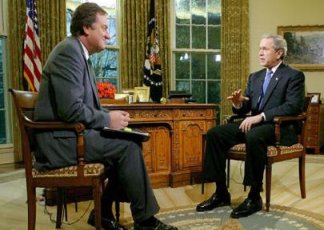 We watched a couple of excerpts from Sunday's Meet the Press interview of Bush (taped today for airing tomorrow). Russert appears to be asking real questions, but in a fairly neutral manner. Bush, on the other hand, does not appear impressive. Sure, Bush-lovers will see what they like, but for the rest of us will find George lacking. Bush appeared to have trouble constructing a response (we saw him when he was expected to reel off a list of countries: Libya, Iran, ... ; he named Libya, but then seemed to be grasping for a second instance - when he mentioned the Pakistani nuke-scientist Kahn - which sounded off-key. (Isn't the administration trying to ignore the Pakistani issue?) It's too early to make a judgement, especially since we don't know the context from which the excerpts were lifted (e.g. what was discussed prior to the excerpt), but the signs are not good for Bush. We took a gander at a Yahoo message board - related to a news item about Bush's statement that Tenet's job is secure (!) - and there, the comments about the interview were: Yes, he was sickly/sallow-looking. He might be using the coke again.
He looked as if he was completely off guard the entire time.
He looks like a figure in a wax museum, not looking well.
Stammered and er um ah er ummed so much you know he was fighting for words to say. Which pretty much agrees with what we saw. By the way, we checked into the Free Republic message threads about the Russert interview, and many are praying for Bush. He needs it. NOTE: The image above has been Photoshopped.
posted by Quiddity at 2/07/2004 08:58:00 PM
0 comments
Friday, February 06, 2004
Missing half the picture: There has been much discusion lately about the problem with intelligence about WMD - was it simply bad or was it manipulated? But don't forget the following point: None of this would be an issue if Bush hadn't embraced the doctrine of preemption. The National Security Strategy of the United States of America was issued around September 2002, and has the following in section V: Prevent Our Enemies from Threatening Us, Our Allies, and Our Friends with Weapons of Mass Destruction (emphasis added) For centuries, international law recognized that nations need not suffer an attack before they can lawfully take action to defend themselves against forces that present an imminent danger of attack. Legal scholars and international jurists often conditioned the legitimacy of preemption on the existence of an imminent threat—most often a visible mobilization of armies, navies, and air forces preparing to attack.
We must adapt the concept of imminent threat to the capabilities and objectives of today’s adversaries. Rogue states and terrorists do not seek to attack us using conventional means. They know such attacks would fail. Instead, they rely on acts of terror and, potentially, the use of weapons of mass destruction—weapons that can be easily concealed, delivered covertly, and used without warning.
The targets of these attacks are our military forces and our civilian population, in direct violation of one of the principal norms of the law of warfare. As was demonstrated by the losses on September 11, 2001, mass civilian casualties is the specific objective of terrorists and these losses would be exponentially more severe if terrorists acquired and used weapons of mass destruction.
The United States has long maintained the option of preemptive actions to counter a sufficient threat to our national security. The greater the threat, the greater is the risk of inaction— and the more compelling the case for taking anticipatory action to defend ourselves, even if uncertainty remains as to the time and place of the enemy’s attack. To forestall or prevent such hostile acts by our adversaries, the United States will, if necessary, act preemptively.
The United States will not use force in all cases to preempt emerging threats, nor should nations use preemption as a pretext for aggression. Yet in an age where the enemies of civilization openly and actively seek the world’s most destructive technologies, the United States cannot remain idle while dangers gather. We will always proceed deliberately, weighing the consequences of our actions. To support preemptive options, we will:
- build better, more integrated intelligence capabilities to provide timely, accurate information on threats, wherever they may emerge;
- coordinate closely with allies to form a common assessment of the most dangerous threats; and
- continue to transform our military forces to ensure our ability to conduct rapid and precise operations to achieve decisive results.
The purpose of our actions will always be to eliminate a specific threat to the United States or our allies and friends. The reasons for our actions will be clear, the force measured, and the cause just. Couple of quick points: They didn't buikd a better intelligence capability, and the common (world) assessment was that war wasn't justified. Agree or disagree with preemption, it remains a fact that it's Bush's policy. We happen to think it's a bad policy in general, but even if one favors preemption, you shouldn't adopt it if the intelligence isn't up to the job. Those who defend Bush by saying that "intelligence is murky" - a contestable point - should then explain why they support a policy of preemption that is conjoined with a "murky" process. NOTE: For fans of the "imminent threat" wordplay, please note that the Bush administration's strategy paper explicitly says: "We must adapt the concept of imminent threat ..." which means that there is the "old" concept of imminent threat ... and a "new" concept of imminent threat - which is the one Bush talked about prior to the war - even if he didn't use those exact words.
posted by Quiddity at 2/06/2004 08:36:00 AM
0 comments
Wow: From last week's New York Times story about Medicare making it harder to get reimbursed for motorized wheelchairs, we read: The controversy over payments for power wheelchairs has been growing as the demand for them has increased. In recent years, Medicare reimbursements have nearly tripled, to more than $845 million in 2002 from just over $289 million in 1999, an increase that reflects a rise in the number of Medicare payments for power wheelchairs, to 159,000 in 2002 from 55,000 in 1999.
For the same period, overall Medicare spending rose by 22 percent as the population of Medicare increased by just 1 percent a year. A 22% increase in four years with a near-steady population? Sounds ominous.
posted by Quiddity at 2/06/2004 08:16:00 AM
0 comments
Thursday, February 05, 2004
A possibility: 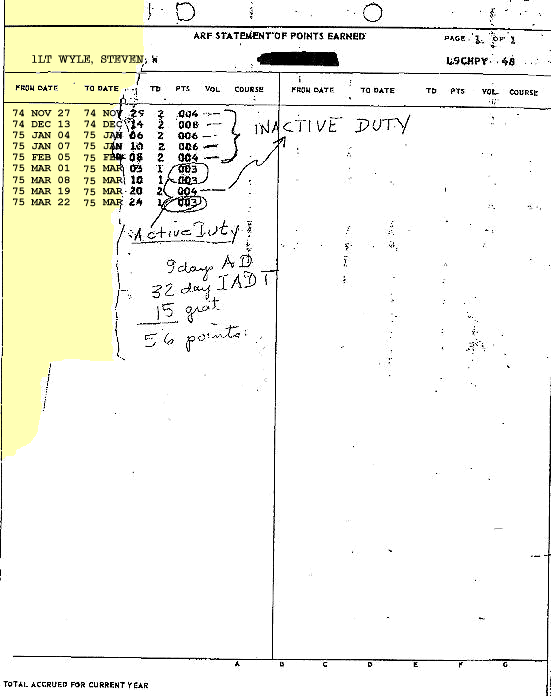 For more, see Calpundit, Mark A. R. Kleiman, Phil Carter (Intel Dump), and awolbush.com. UPDATE: This "reconstructed" document is meant to be satire. Also, the name WYLE was plucked out of the phone book (and has no relation to the Wyle brothers who supported Bush in 2002). The nams Steven is that of a friend of ours. The point of the post was to present an alternate-reality in order to force the issue: How can anybody feel confident the torn document is really a record of Bush's service? IS THAT YOUR FINAL UPDATE? You've probably already read about it, but the infamous "torn document" appears to be genuinely associated with Bush's service in the Texas Air National Guard. Still, there is much more to be learned about it. Your best place for following the nitty-gritty details are over at Calpundit, who has several posts on the subject. But perhaps it's best to start with the current posting which is here. Other commentary can be found at the Daily Howler and at Talking Points Memo.
posted by Quiddity at 2/05/2004 05:59:00 AM
0 comments
Wednesday, February 04, 2004
Recycled: We did this a little over a year ago, but thought we'd throw it up today in light of Kerry being in the news. The assault by Kaus and Sullivan has already started, but is sure to become more intense over time.  posted by Quiddity at 2/04/2004 11:21:00 AM
posted by Quiddity at 2/04/2004 11:21:00 AM
0 comments
Hot potatoe! Dig these excerpts from the New York Times story, Bush Urges U.N. to Help Fix Iraqi Clash on Rule: (emphasis added) - President Bush pressed Kofi Annan, the United Nations secretary general, on Tuesday to have his aides mediate among quarreling factions in Iraq and forge a consensus behind a plan that would allow the transfer of sovereignty to a government in Baghdad by June 30, administration officials said.
- Mr. Annan has been given a dozen options for the transfer of sovereignty, the officials said, ranging from holding direct elections before June 30 to overhauling radically the unwieldy caucus system that is supposed to choose a new national assembly by that date.
- "We are trying to put this issue in Kofi Annan's lap and let him run with it," one official said. "There's still very much the intention to stick with the date of June 30.
posted by Quiddity at 2/04/2004 09:54:00 AM
0 comments
What is to be done? Weblog Busy, Busy, Busy, has what should be done - by Daschle. Check it out.
posted by Quiddity at 2/04/2004 09:42:00 AM
0 comments
Tuesday, February 03, 2004
A milestone: Today marks the day when our unique visitor count hit half a million. We thank all our readers for taking the time to visit this weblog over the past 18 months. UPDATE: Talk about being upstaged! We went over to Atrios, and he's just logged his 10 millionth visitor! We congratulate Atrios for doing so well, and for being a such a valuable resource for us all.
posted by Quiddity at 2/03/2004 05:26:00 PM
0 comments
Impartial?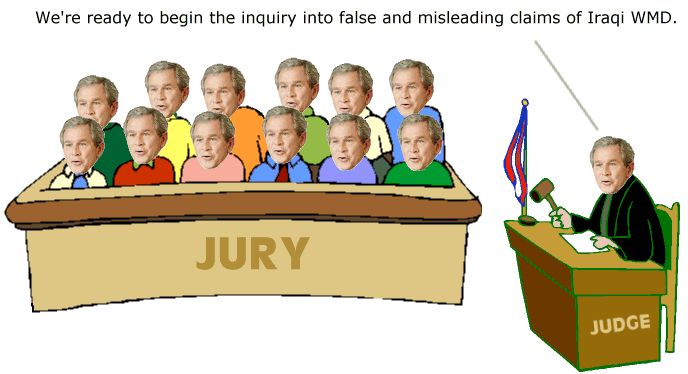 All kidding aside, we think that if Bush gets away with investigating himself (actually investigating others), it will be a travesty. We are outraged at the mild response from key Democrats (that means you, Daschle) and the press in general. It appears that the public is ahead of the pundits, the politicians, and the press on this issue.
posted by Quiddity at 2/03/2004 08:52:00 AM
0 comments
Administrative update: Thanks to the miracle of modern technology, we have lost every single image file for posts prior to mid-January 2004. This is a problem with our hosting service (not us). We are working to resolve it.
posted by Quiddity at 2/03/2004 05:34:00 AM
0 comments
Get ready for it: Bush announces "independent", bi-partisan panel to investigate intelligence shortcomings:  | | Sen. Pat Roberts | Rep. Billy Tauzin | Hon. James Baker III | | Hon. Henry Kissinger | Lord Hutton | Hon. James Woolsey | | Sen. Zell Miller | Sen. Patrick Moynihan | Susan Estrich | |
posted by Quiddity at 2/03/2004 04:12:00 AM
0 comments
Monday, February 02, 2004
It's going to take a long time to finish: 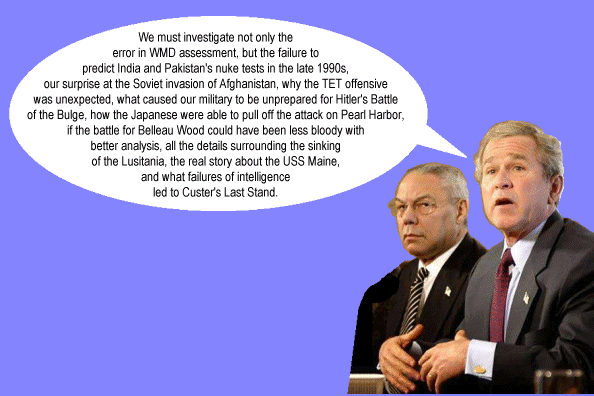 posted by Quiddity at 2/02/2004 02:03:00 PM
posted by Quiddity at 2/02/2004 02:03:00 PM
0 comments
"No WMD" fallout: Now that pretty much everybody agrees that Iraq doesn't - and didn't - have WMD, the view is that Iraq wasn't a threat the the United States. But don't forget that there's another player out there - al Qaeda - and they were judged to be a big threat because they could aquire WMD from Iraq (at least that's what was said). So if Iraq doesn't have WMD, al Qaeda doesn't either (alfer all, it was only the "evil" Saddam who was capable of such horror; no other state measured up to his standard). So, al Qaeda isn't such a big threat after all. This has been our position from the beginning. We acknowledge that al Qaeda can still try to hijack planes and pilot them into things as well as leave truck and car bombs around, but that isn't the same thing as a state-power-threat. So maybe we can all settle down a little and be less hysterical (and dispense with the PATRIOT Act and Total Information Awarness, and such).
posted by Quiddity at 2/02/2004 06:56:00 AM
0 comments
Sunday, February 01, 2004
What we are likely to see - eventually: We listened to Ian Master's Background Briefing radio program today, and one of the guests was Ray McGovern, a twenty-seven year career analyst for the CIA and a co-founder of Veteran Intelligence Professionals for Sanity. In a discussion on the WMD issue, the focus shifted to what George Tenet knows - and if that knowledge is what's keeping Bush from firing him. McGovern thought it might be the contents of the 6 August 2001 Presidential Daily Briefing. From what McGovern said - plus some additional Google-related searching ( Sunday Herald, Guardian, CNN, more), we think it looked something like this: 6 August 2001 Presidential Daily Briefing Bin Laden Determined to Strike in U.S. - An attack inside the United States is being planned by Osama bin Laden's al-Qaeda.
- The Saudi-born terrorist hopes to 'bring the fight to America' in retaliation for missile strikes on al-Qaeda camps in Afghanistan in 1998.
- British Intelligence says:
- That in 1998 al-Qaeda operatives discussed hijacking a plane to negotiate the release of Sheikh Omar Abdel Rahman (the Muslim cleric imprisoned in America for his part in a plot to blow up the World Trade Centre in 1993).
- The United States should expect multiple hijacking of aircraft.
- We know there has been flight training by Muslim students.
- We believe there are al-Qaeda cells currently in the United States.
|
You know how the game is played. Even though we have a pretty good idea of the situation, until the actual piece of paper is released, there won't be a scandal. But it will be released.
posted by Quiddity at 2/01/2004 02:54:00 PM
0 comments
Backdrop: 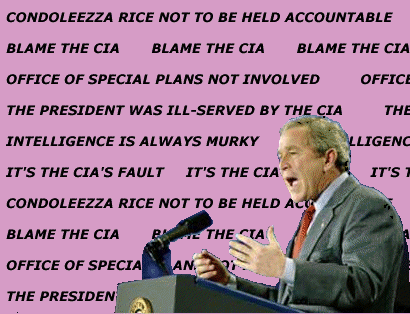 |
U.S. President George W. Bush speaks at the Congress of Tomorrow luncheon in Philadelphia on January 31, 2004. President Bush is leaning toward endorsing an independent inquiry into intelligence used to justify an invasion of Iraq , despite his earlier resistance to such a probe, sources said. Bush has faced pressure from both Democrats and Republicans on Capitol Hill to accept an investigation after former chief U.S. weapons hunter David Kay said he did not believe Iraq had any stockpiles of illicit weapons. Evidence of such weapons were the main reason Bush cited for launching the war. |
posted by Quiddity at 2/01/2004 11:35:00 AM
0 comments
|